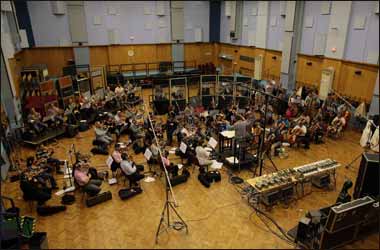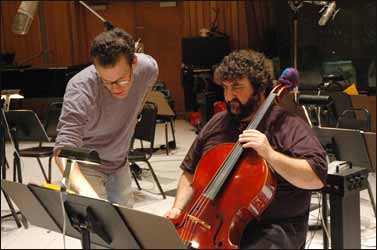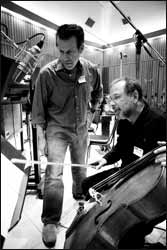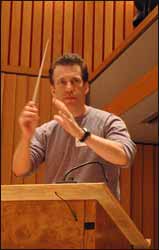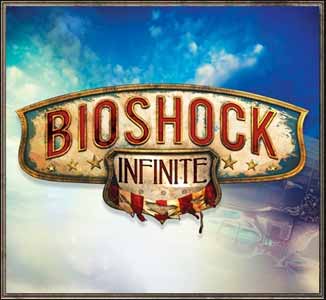|
Click here to return to the main site. Garry Schyman (composer) - BioShock: Infinite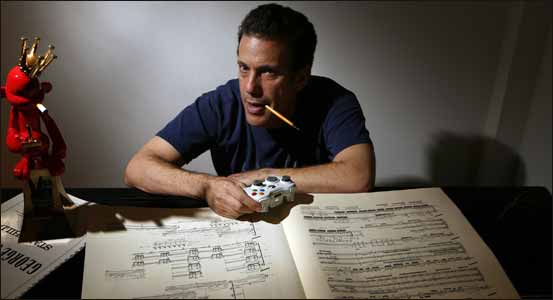 Award-winning composer Garry Schyman has written music for feature films, prime time television series, mini-series, movies of the week, documentaries and interactive media. Renowned for his unique and often complex original scores for the multi award-winning video games BioShock, BioShock 2, BioShock: Infinite; the dramatic orchestral score and chorus for Visceral Games’s adaptation of Dante Alighieri’s epic poem, Dante's Inferno; and the classic sci-fi inspired original scores for Destroy All Humans!; Schyman has emerged as one of the industry's foremost composers, receiving top honours for Best Original Score from the Academy of Interactive Arts & Sciences and Spike TV. Darren Rea caught up with Schyman as BioShock: Infinite was released... Darren Rea: The music for the original BioShock game was, for me, one of the highlights. It was the beautiful themes that, mixed with the off key strings, really made the hair on the back my neck go up. Was that the original brief? Or was that something that you came about once you started composing?
DR: The music for BioShock: Infinite is just as creepy and unsettling. Was it hard to go back to a familiar subject and come up with something new - when gamers are expecting a certain sound for the game? GS: I think the fact that the game’s setting and time is so completely different from the original BioShock freed us from any of that. It really gave us the green light to approach it with a fresh palette. Additionally Ken Levine, the game’s creative director, wanted something new and fresh to complement the new look of the game. I think we would have cringed if I had just recycled the same old sound from the original BioShock. DR: What's the hardest aspect of composing and what's the most satisfying? GS: I would have to say that the hardest part is looking at the blank page, so to say, and starting... Finding the idea that works and more than just working because you can sometimes find an easy answer to the problem at hand, but finding something that really is good and original and also works. It’s very intimidating. It’s a challenge and your client may reject what you just spent twenty hours writing and send you back to the drawing board.
There’s two things I find very satisfying about the composing process. One is finding the right music and the joy that comes with that discovery. It’s a heady moment and sometimes it is so exciting that I have to get up out of my chair and take a walk. I feel euphoric, really euphoric. Other than my family, nothing makes me happier than writing a good piece of music. The other thing I love is recording my music with live players, especially working with an orchestra. Just an amazing experience and hearing your music come alive is wonderful. Not work at all, really just like a kid at Disneyland! DR: Is there ever enough time and money? GS: Oddly enough the answer is yes. Particularly in video games there is often more than enough time to write the music. In fact I am often waiting for them to give me the material and direction I need to keep writing. The good news is it often permits you to work on more than one game at a time.
As far as budgets are concerned, I am very good at making the most of what I am given. I almost always have the budget for an orchestra or sufficient live instruments to make the music sound like I want it to. I have a lot of experience budgeting and I know how to make a dollar stretch. Pretty valuable when you want the score to sound like feature film quality on much more modest means. Still I usually have a lot more than nearly all low budget movies and television composers who get to hire live musicians and studios etc. DR: Do you remember the first time a piece of TV/cinema music really affected you? GS: Yes I do. It was as a child watching the old film Mysterious Island on television. The score by Bernard Herrmann was magical and mystical and felt different from what I had been used to hearing. It started me thinking about the whole industry. I still love that score! DR: Who would you say, musically, is your biggest inspiration when it comes to composing?
GS: Really just the project in front of me. It helps when the project is very creative and is being made with love by those who really love what they are doing and are dedicated to making something wonderful and not just something they hope people will buy. Passion begets passion so to say. Once I start composing a piece of music the logic of the composition inspires me to finish it. DR: What's the best and worst aspects of working in the industry at present and has it changed much over the years? GS: The best thing is that I get to write very interesting music most of the time. The triple A games that I get offered are very creative and if they hire me it’s because they want me to do the best I can and to be as creative as I possibly can be. Plus they usually have a decent production budget which permits me to hire a live orchestra which I love writing for. The worst part is that there are no backend residuals or royalties which you do get when scoring films and television. That may sound mercenary but contract composers are not employees and you may have ups and downs in your career. Having worked in film and television I have to say there is nothing like getting those royalty checks when you haven’t had a gig for 6 months. It permits you longevity and to stay in the “game” until the next opportunity comes along. Other than that I love scoring games.
The industry is constantly changing and at the moment there seems to be some retrenchment in making the big cinematic games (which are very expensive) until we find out if console games will continue to sell or not. It will definitely look different in five years. DR: If you could file away one piece of your music for your great, great, great grandchildren to unearth what would it be? GS: Interesting and tough question but I think I would like them to hear my viola concerto Zingaro. It’s in three movements and I really do love what I wrote. It is going to be performed for the first time this Fall. DR: If you weren't working in this field what would you like to do? GS: I’d like to have a blueberry farm in Oregon. I worked on one for a few days when I was 18 and loved it! That’s my fantasy anyways. DR: What are you working on at present? GS: A movie and a video game. I can’t tell you more than that.
The soundtrack to BioShock: Infinite is available with the 'Ultimate Songbird' or 'Premium Edition' of the game. Return to... |
|---|
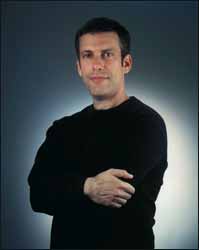 Garry Schyman: The original brief was that this was going to be one of the scariest games ever. They also eschewed traditional Hollywood style film score and wanted something very unique. That was it. It took a lot of trial and error to come up with what became the style for the score I ended up writing. Plus once you find a good approach, as you compose the music keeps expanding on itself and suggesting new and cool things to add. In other words the more I wrote the better the score got.
Garry Schyman: The original brief was that this was going to be one of the scariest games ever. They also eschewed traditional Hollywood style film score and wanted something very unique. That was it. It took a lot of trial and error to come up with what became the style for the score I ended up writing. Plus once you find a good approach, as you compose the music keeps expanding on itself and suggesting new and cool things to add. In other words the more I wrote the better the score got.